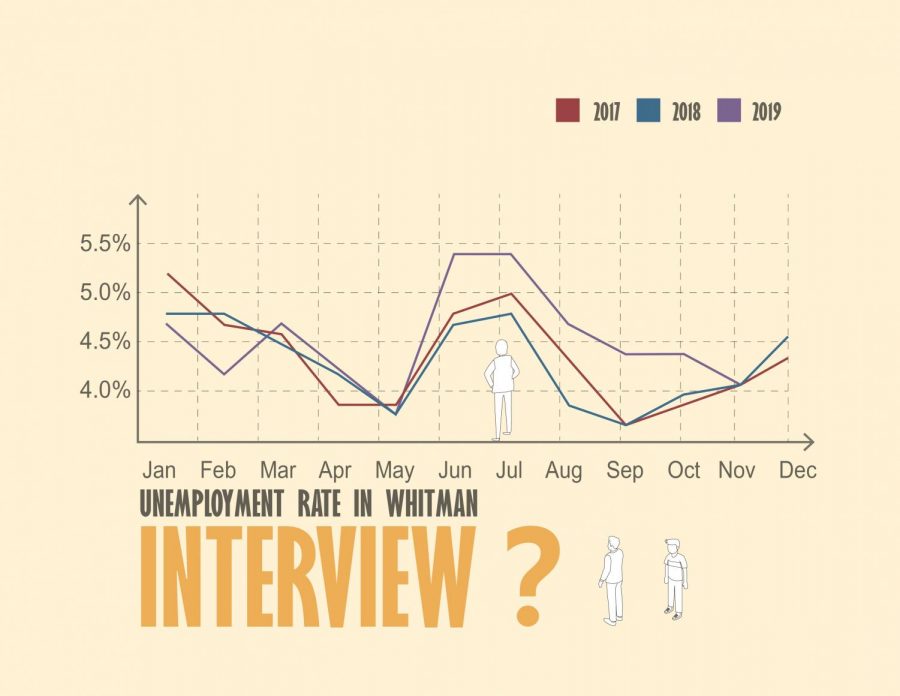Pullman needs to address underemployment
Underemployment is a real danger to Pullman’s economic health, the city needs to prepare for possible downturn
With so little data on underemployment taken on the local level, this puts the economy Pullman at a huge risk if the city has not gathered enough information to properly understand the best way to weather any economic hardship
January 15, 2020
With the continued fall of unemployment rates in the United States, now more than ever we must examine overlooked issues facing our economy, like underemployment. We need to expand studies into underemployment and continue the programs in Washington state that are combatting it.
According to Merriam-Webster, underemployment is when a person is either unable to work full-time at their job or is working somewhere they are overqualified for.
Someone who is unemployed doesn’t have a job despite trying to find one, whereas underemployment is someone who is working, and wants to do more in the workforce, by either working more at their current job or finding one for which they are more suited.
“Underemployment is a huge opportunity with unemployment as low as it is. We have an untapped labor pool,” said Alivia Metts, an economist with Economic Modeling Specialists International and a former regional economist with the Idaho Department of Labor. “It’s like the rising tide. If everybody is moving upward, there’s more money in the economy, people are buying houses and property rates go down.”
Despite the importance of this topic, the Bureau of Labor Statistics doesn’t track underemployment on the same scale it tracks unemployment, Metts said. They track unemployment down to a county level but only track underemployment to a state level. Not having local statistics for underemployment makes it impossible to combat on a local scale.
This makes informed decisions about reducing underemployment very difficult because there is less information on where resources and time should be invested. If these decisions are made well, it would serve to boost our economy, or help heal it in a time where growth wasn’t felt.
More studies need to come from the Bureau of Labor Statistics about underemployment so that this problem can be confronted in the most effective way.
That said, there is good work that is being done on underemployment both statewide and right here in Whitman County. An example of this work is Washington state’s own WorkSource program.
“WorkSource are local offices in communities that bring together employment security and other agencies to assist re-employment,” said Doug Tweedy, a Washington state regional economist. “It’s been very successful. Even in a good economy there are people, whether laid off in mergers or consolidations or technology, we will always have people trying to transition into a good economy.”
Underemployment is something to worry about in Pullman. Pullman has a student population who need to worry about getting a job they deserve with the degree they have. Whitman County might experience more underemployment if the agricultural industry takes a hit.
While the economy is growing now and is reducing underemployment, WorkSource will become even more important in an economic downcycle, said Tweedy
In a time of growth, it is all too easy to pretend that the economy will never again encounter pain, and do nothing to invest in nationwide programs that help fight that pain.
Not investing in economic relief programs in a period of growth, like WorkSource, is like not saving for a personal emergency when times are easy for you. It isn’t safe, it isn’t practical and it isn’t smart.
The work that WorkSource does is critical. They help people transition into better paying jobs, which helps economic growth and provides personal satisfaction for those moving up in the economy.
The government needs to invest in programs like WorkSource and expand our knowledge of underemployment so that we can have a better understanding of the issues facing our changing economy.
If you are concerned about underemployment, get more involved in local government, or contact a trusted official.











Riccardo Tiavante • Jan 15, 2020 at 9:13 am
Why is underemployment the responsibility of the state government?
And no one “deserves a job”. If your skillset matches what an employer needs and is willing to pay for, then consider yourself employed. Otherwise, you have no right to another’s possession, i.e., Their business and the income made there.